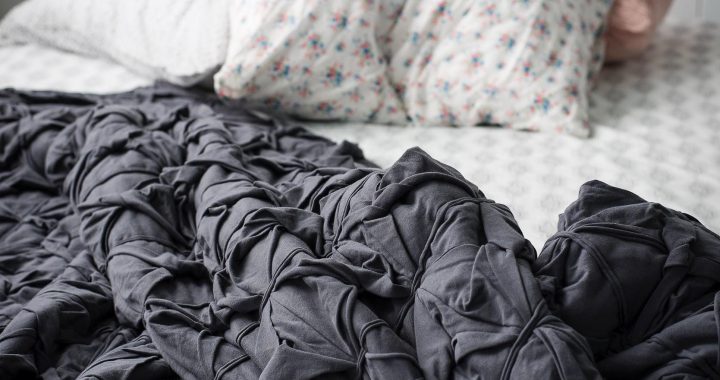Everyone has a restless night once in a while, but you shouldn’t be tossing and turning more often than not. If you are, there’s probably something else going on. From bad habits to health problems, here are nine common causes of sleep problems and what you can do about them.
1. You’re stressed (or depressed)
Does your mind start racing with anxiety the second your head hits the pillow? Unfortunately, there’s no quick fix for sleep problems caused by stress and depression. In addition to seeking mental health support, learn coping strategies to help you sleep, like meditating or writing thoughts down in a journal.
2. You’re uncomfortable
Whether it’s a lumpy mattress, a flat pillow, too-warm sheets, or your own aches and pains, nighttime discomfort wreaks havoc on sleep quality. Upgrade your mattress and bedding, taking your sleep position into account as you shop. If you have chronic pain, research effective management strategies.
3. You can’t breathe
If you have asthma, allergies, COPD, or another respiratory condition, reduce nighttime coughing, wheezing, and breathlessness by making your bedroom an allergen-free zone. Keep pets out, install dust-proof covers over mattresses and pillows, and wash bedding regularly (the American Cleaning Institute recommends weekly for sheets and monthly for blankets) to banish allergens from your sleeping surface. Next, turn your attention to the air. Contaminants enter your bedroom through air ducts and windows, but you don’t want to cut off air circulation completely. Consider buying an compact air purifier, which helps remove pollutants, and be sure to regularly replace your air filter.
4. Your sleep schedule is erratic
A consistent sleep schedule regulates your circadian rhythm, the internal clock that tells your body when it’s time to feel sleepy and when it’s time to be alert. A sleep schedule also ensures you set aside enough time for sleep each night — seven to nine hours for adults.
5. You have a sleep disorder
From restless leg syndrome to sleep apnea, there are a variety of sleep disorders that impact a person’s ability to fall asleep, stay asleep, and achieve deep, restful sleep. If you’ve optimized your sleep habits and still lay in bed awake at night or feel fatigued throughout the day, schedule a sleep study.
6. You’re too sedentary
If you expend little energy throughout the day, it’s not surprising if you don’t feel tired at night. And unfortunately, this is a common tale: As USA Today reports, only 23 percent of Americans get the recommended amount of exercise. If you’re staying up late because you don’t feel tired, work more physical activity into your days.
7. You can’t put down your phone
Your sleep schedule isn’t the only thing affecting your circadian rhythm. Looking at screens on smartphones, tablets, computers, TVs, and other devices stops you from feeling sleepy. While this is handy when you need to pull all-nighters in college, using devices late into the night isn’t a healthy habit to get into. Stop using electronics an hour before bedtime and banish electronics from the bedroom.
8. You’re perimenopausal
For a variety of reasons, sleep problems are common in perimenopause and menopause. For most women, adopting good sleep hygiene is the best management strategy for menopause-related sleep issues. However, some women may benefit from hormone replacement therapy.
9. Your medications are keeping you up
Several prescription and over-the-counter medications interfere with sleep. These include steroids, antidepressants, stimulants, thyroid medication, beta agonists, and asthma medication. Certain over-the-counter medications like some pain relievers and cold medicines contain caffeine that disrupts sleep; others, such as sleeping pills, create a dependence that prevent you from falling asleep without them.
Sleep is essential for good health. If one of these sleep problems sounds like you, it’s important to do something about it. Whether that means changing your habits, seeing your doctor, or redoing your bedroom, take action to fix your sleep today.
Guest Author Bio: Julia Merrill is on a mission. She wants to use information to close the gap between medical providers and their patients. She started BefriendYourDoc.org to do just that. The site offers an abundance of information from tips on finding the right medical care to help with dealing with insurance companies to general health and wellness advice and more.
Image via Unsplash


 Searching for gifts for friends or family members with allergies or food sensitivities? Check out our patients’ and doctors’ ideas, from the practical to the creative, with some that are very tasty!
Searching for gifts for friends or family members with allergies or food sensitivities? Check out our patients’ and doctors’ ideas, from the practical to the creative, with some that are very tasty!
